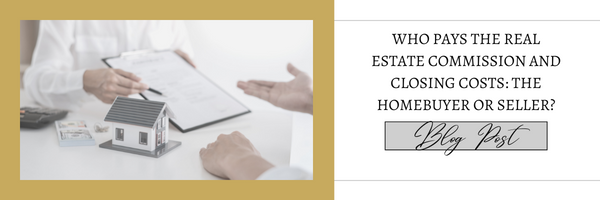Who Pays the Real Estate Commission and Closing Costs: The Homebuyer or Seller?
Who pays the real estate fees
If you’re buying a home, you’re likely off the hook for paying the real estate agent commission because the home seller is almost always responsible. The fee is paid by the seller at the settlement table, where the fee is subtracted from the proceeds of the home sale.
When the sellers set a listing price for the home, they usually take the real estate agent’s commission into account—and consider it the cost of doing business. Once the commission is received, the listing agent shares part of it with the buyer’s agent who brought the buyer to the table
Typically, the buyer’s agent and the seller’s agent split the commission, which is often a percentage of a home’s price. So if a home sells for $200,000 at a 6% commission, the seller’s agent and buyer’s agent might split that $12,000, with each receiving $6,000.
Do you have to pay a real estate agent commission?
Though you could technically forgo the fee by selling or buying a home without an agent, i
Do you have to pay a real estate agent commission?
Though you could technically forgo the fee by selling or buying a home without an agent, it’s important to note that agents are the experts in this scenario, working on your behalf while ensuring the process is as stress-free as possible. For example, the agent will start by helping you price your home, then marketing it (on the MLS, social media, and other venues), negotiating with homebuyers, and seeing the home sale through closing.
A recent survey found that the typical “For sale by owner” home sold for much less than an agent-assisted home sale, according to the National Association of Realtors®. It’s no wonder an overwhelming majority of home sellers use an agent to sell their house.
Also keep in mind that real estate deals often take weeks, if not months—though most agents won’t see a dollar of it until a property closes.
t’s important to note that agents are the experts in this scenario, working on your behalf while ensuring the process is as stress-free as possible. For example, the agent will start by helping you price your home, then marketing it (on the MLS, social media, and other venues), negotiating with homebuyers, and seeing the home sale through closing.
A recent survey found that the typical “For Sale By Owner” home sold for much less than an agent-assisted home sale, according to the National Association of Realtors®. It’s no wonder an overwhelming majority of home sellers use an agent to sell their house.
Also keep in mind that real estate deals often take weeks, if not months—though most agents won’t see a dollar of it until a property closes.
Dual agency: When one agent represents two parties
It’s not a common situation in real estate, but if the agent you’ve hired to represent you also represents the seller of the house you’re buying, it’s called dual agency. Dual agents, also known as transaction brokers, represent the interests of both the buyer and the seller.
Critics who advise against dual agency worry about potential conflicts of interest—the chance that the interests of both the buyer and seller will not be met. And to their credit, we understand how this could be a problem. When it comes to real estate commission, a dual agent gets to keep everything because he or she is doing more work by representing both sides.
What do closing costs cover?
Closing costs are the miscellaneous fees separate from the real estate agent fees that must be paid at closing. They cover the following things:
- Loan processing
- Title company fees
- Surveyor costs (if needed)
- Recording of the real estate deed
- Insurance
- Any taxes or homeowners association fees, which might need to be prorated if they’re already paid
The amount of the real estate closing costs will vary with each home sale/purchase and can range widely from 2% to 7% of the home’s purchase price. Typically, though, closing costs amount to about 3.5% of the sale price of a home. Your agent will provide you with a buyer’s sheet that lays out the closing costs, and by federal law, you must receive what’s called a “good-faith” estimate of your closing costs from any lender you use in your real estate purchase. As for who pays the closing costs, that’s where your negotiating skills (or your agent’s) come into play. There is no cut-and-dried rule about who—the seller or the buyer—pays the closing costs, but buyers usually cover the brunt of the costs (3% to 4% of the home’s price) compared with sellers (1% to 3%).
Remember,
buying and selling a home might be the biggest financial transactions of your life—which is why you’ll want an expert on your side, even if that comes at an expense. And whether you’re the buyer or the seller, the listing price isn’t the only number you should focus on. Those fees outside the price of the house can add up, and you don’t want to be hit with any surprises late in the game.
Source: www.realtor.com




 Facebook
Facebook
 X
X
 Pinterest
Pinterest
 Copy Link
Copy Link

